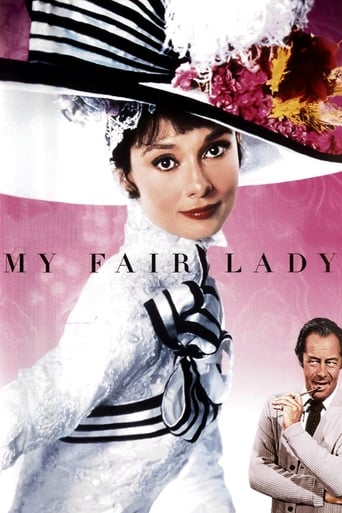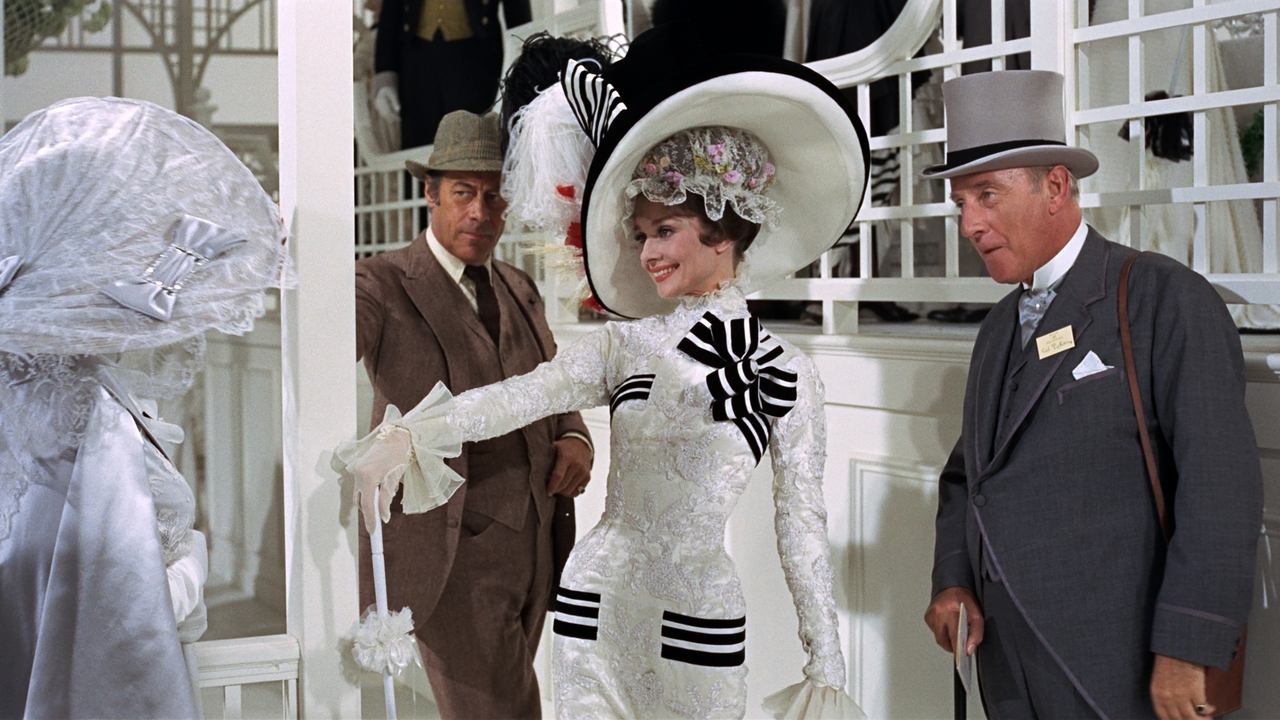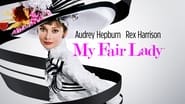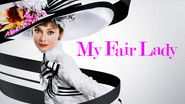rodrig58
Audrey Hepburn is really delicious, as do Rex Harrison. Frederick Loewe's music is beautiful, the movie is long. But, due to the charm of the two actors, it is being watched with pleasure.
gkeith_1
Henry hates women. He is a mama's boy.This show is about a woman, but Henry wants to snag all the applause. He is snotty to women of what he thinks is the lower class.Henry is old, but unmarried and childless. Who could live with him, anyway? Mama tries to set him straight, but he is too stubborn.Henry is an obnoxious, selfish misogynist. His life revolves around his bratty self. Pygmalion, indeed. Pulling the strings, eh? End of my rant about stupid Henry Higgins.Now on to my observations about lovely Audrey Hepburn. Her pink outfit and matching hat are just divine. Freddy is a really cute number. Eliza jumps all over the vegetable cart with such divine movement and timing. She is joyously happy to be alive.Eliza's white ball costume is just divine. Her hair updo is just scrumptious. She even convinces the Theodore Bikel character that she is real royalty (???). I think Eliza surprised Henry and Colonel Pickering more than they thought that she would. Their creation became super popular. Henry and Pickering who? Pickering was an actual gentleman, opposed to Henry who was a childish, spoiled brat.Final scene: Henry ordering Eliza around, to pick up his slippers. What a moron. Get them yourself, you stupid idiot. Whatsa matter? Mama not around to pick up after you? Get a life. Who would want to marry you, anyway? I still liked this movie. It is a family favorite, for eons. The flower girl did succeed in shoveling it to old Henry. She was capable of being out on her own now.From clothing, I would guess the time period would be around 1910-1912. World War One was just around the corner. Henry would have still been studying obscure dialects, lost in his goofy nitwit cloud of oblivious nonchalance.The singing and dancing: you know that they are my favorites. So what if some singing is dubbed. It is still a wonderful show. Some characters even talked-sang.Still a 10/10.
pyrocitor
"Your ending is damnable; you ought to be shot!" So boomed George Bernard Shaw, upon witnessing the ending of Pygmalion, his slashing satire of class and gender disparities, changed from its original intent. In Shaw's words, leading lady Eliza Doolittle ended the play by proudly walking out on Professor Henry Higgins, her sneering tutor. To Shaw's chagrin, subsequent performances had twisted the climax into a more populist, albeit disingenuously romantic, 'happy ending.' Flash-forward forty years, by the time My Fair Lady, the filmic revival of the now beloved Broadway musical, was released, audiences would have expected nothing less. And yet, for a show heralded as "the perfect musical," it's startling how, nostalgic haze aside, how many of the film's attributes have aged poorly to the point of being resoundingly un-fair - none the least, that 'damnable' ending itself. This isn't to say that the film is worthy of the kind of lambasting Higgins bestows upon Eliza, upon first glimpsing her in her unrefined, working class inelegance (ahh, romance). Granted, for one of the defining directors of the Classical Hollywood screwball era, George Cukor's work here is thoroughly sleepy, with the skeletal plot lumbering along with such an unhurried dopiness that an hour could easily have been shaved off the running time without batting an eye. Even the songs, unforgettably catchy as they are, are staged with an oddly docile tentativeness. Even the most iconic tunes come across as shy and tentative rather than the lively vivaciousness they warrant. Where Cukor really perks up is in mischievously digging into the show's social critique, lambasting English high society's priggish, disinterested disdain for the less fortunate with gleeful abandon. Sure, the endless montages of Higgins' antiquated speech language pathology turned sadistic psychological torture bring their share of comedic relief, but the film's brightest, most engaging moment is its central horse race scene, where droves of virtually sleepwalking society men and women raise and lower their opera glasses in synch like cows chewing their cuds, just waiting to be shaken up by Eliza Doolittle's feisty bull in a china shop. Similarly, Cukor spares no expense in costume and set design, as the two diametrically opposed social stations - the grungy London ghetto and prim society balls - look gorgeously, spectacularly vivid in their own respects. Tranquilized execution or not, there's no denying the film's 'loverlyness,' and it carries enough charm to keep afloat, especially when punctuated by welcome moments of acrid, Shawsian wit. Ah yes - but then there's that romance, boldly paving the way for decades of romanticized unhealthy relationships in a way that even Grease's 'change everything for your man!' climax would shudder at. It's certainly no fault of the performers. Hepburn herself is an absolute effervescent delight, as Eliza's course roots allow her to gleefully cast off her tried and true airs of consummate elegance with a hysterical, sparky firebrand of a performance, Monty Python cockney accent and all (it's a shame she wasn't allowed to contribute her own singing, as the unnecessary dubbing during musical numbers is detrimentally distracting). Similarly, Rex Harrison's nimble elocution and pristinely condescending eyebrows light up Henry Higgins' monolithic misogyny with a sneering charisma that makes him distressingly hard to hate, even at his most loathsome. In fact, therein lies the film's most unshakeable concern: Higgins is so farcically abhorrent to Eliza throughout that it's impossible for his third act romantic about-face not to play as just as grotesque, abusive and controlling. Different direction or actor interpretation could have teased out nuances of redemptive shame in Higgins' transformation (there's even an arguable undercurrent of Higgins as a closeted homosexual fighting for societal or matriarchal validation through heteronormative normalcy - "Why can't a woman be more like a man," anyone?). Instead, Harrison plays him as so deliciously, unrelentingly despicably throughout that we're eager for him to get a colossal comeuppance, not a simperingly happy ending. Seldom has so sharp and sweet a film ended on such an uncomfortably false note - even Hepburn's face and body language are saturated with this uneasiness in her purportedly cute final appearance - and it can't help but taint the entire film as consequence. Loverly 'dis ain't. Guaarrn. This isn't all to say that your childhood is ruined, and My Fair Lady is an unredeemable write-off - it's fun, frilly, and peppered with moments both delightful and dastardly witty. Still, contemporary gender politics haven't been kind to this one, and it's important to contextualize how uneasy and unsatisfying a watch the film is amidst its many delights. We've grown accustomed to its face, but that shouldn't excuse the scowl it works hard to hide under its prettiness. -6/10
mihajlo_bn_1994
I watched this movie with a lot of reserve, since I am not a fan of musicals and old movies. "My Fair Lady" forced me to expand my views and start watching more movies from this genre. But this will stay one of the best musicals ever! Didn't like the way it ends, although I understand that this is classic ending.Audrey Hepburn is just amazing and loud. Rex Harrison, in this movie, is simple natural misogynist. Alfred P. Doolittle was annoying, especially when he took money from Professor Henry Higgins.Audrey Hepburn is denied Oscar, she wasn't even nominated, although this movie claimed 8 Oscars and was nominated for four more.



 AD
AD

















